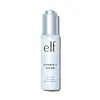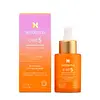What's inside
What's inside
 Key Ingredients
Key Ingredients

 Benefits
Benefits

 Concerns
Concerns

 Ingredients Side-by-side
Ingredients Side-by-side

Water
Skin ConditioningEthoxydiglycol
Humectant3-O-Ethyl Ascorbic Acid
Skin ConditioningGlycerin
HumectantPropylene Glycol
HumectantTocopheryl Acetate
AntioxidantSodium Hyaluronate
HumectantPunica Granatum Extract
AstringentButylene Glycol
HumectantCoceth-7
EmulsifyingPPG-1-PEG-9 Lauryl Glycol Ether
EmulsifyingPEG-40 Hydrogenated Castor Oil
EmulsifyingDisodium EDTA
Caprylyl Glycol
EmollientEthylhexylglycerin
Skin ConditioningPhenoxyethanol
PreservativeParfum
MaskingWater, Ethoxydiglycol, 3-O-Ethyl Ascorbic Acid, Glycerin, Propylene Glycol, Tocopheryl Acetate, Sodium Hyaluronate, Punica Granatum Extract, Butylene Glycol, Coceth-7, PPG-1-PEG-9 Lauryl Glycol Ether, PEG-40 Hydrogenated Castor Oil, Disodium EDTA, Caprylyl Glycol, Ethylhexylglycerin, Phenoxyethanol, Parfum
Water
Skin ConditioningGlycerin
HumectantPhosphatidylcholine
EmulsifyingPolymethyl Methacrylate
PEG-40 Hydrogenated Castor Oil
EmulsifyingAmmonium Acryloyldimethyltaurate/Vp Copolymer
Alcohol
AntimicrobialAscorbyl Glucoside
AntioxidantBenzoic Acid
MaskingBis-PEG-18 Methyl Ether Dimethyl Silane
EmollientButylene Glycol
HumectantCaesalpinia Spinosa Fruit Extract
Skin ProtectingCaprylyl Glycol
EmollientCentella Asiatica Extract
CleansingCI 15985
Cosmetic ColorantCitral
PerfumingCitronellyl Methylcrotonate
MaskingLimonene
PerfumingDisodium EDTA
Hydrochloric Acid
BufferingKappaphycus Alvarezii Extract
Skin ConditioningLinalool
PerfumingMagnesium Ascorbyl Phosphate
AntioxidantMethylsilanol Mannuronate
Skin ConditioningParfum
MaskingPhenoxyethanol
PreservativePolysorbate 20
EmulsifyingPolysorbate 60
EmulsifyingPotassium Sorbate
PreservativePropylene Glycol
HumectantSodium Ascorbate
AntioxidantSodium Chloride
MaskingSodium Cholate
Skin ConditioningSodium Hyaluronate
HumectantSodium Hydroxide
BufferingSoluble Proteoglycan
Skin ConditioningSorbic Acid
PreservativeTocopheryl Acetate
AntioxidantTriethyl Citrate
MaskingTrisodium Ascorbyl Palmitate Phosphate
AntioxidantXanthan Gum
EmulsifyingWater, Glycerin, Phosphatidylcholine, Polymethyl Methacrylate, PEG-40 Hydrogenated Castor Oil, Ammonium Acryloyldimethyltaurate/Vp Copolymer, Alcohol, Ascorbyl Glucoside, Benzoic Acid, Bis-PEG-18 Methyl Ether Dimethyl Silane, Butylene Glycol, Caesalpinia Spinosa Fruit Extract, Caprylyl Glycol, Centella Asiatica Extract, CI 15985, Citral, Citronellyl Methylcrotonate, Limonene, Disodium EDTA, Hydrochloric Acid, Kappaphycus Alvarezii Extract, Linalool, Magnesium Ascorbyl Phosphate, Methylsilanol Mannuronate, Parfum, Phenoxyethanol, Polysorbate 20, Polysorbate 60, Potassium Sorbate, Propylene Glycol, Sodium Ascorbate, Sodium Chloride, Sodium Cholate, Sodium Hyaluronate, Sodium Hydroxide, Soluble Proteoglycan, Sorbic Acid, Tocopheryl Acetate, Triethyl Citrate, Trisodium Ascorbyl Palmitate Phosphate, Xanthan Gum
 Reviews
Reviews

Ingredients Explained
These ingredients are found in both products.
Ingredients higher up in an ingredient list are typically present in a larger amount.
Butylene Glycol (or BG) is used within cosmetic products for a few different reasons:
Overall, Butylene Glycol is a safe and well-rounded ingredient that works well with other ingredients.
Though this ingredient works well with most skin types, some people with sensitive skin may experience a reaction such as allergic rashes, closed comedones, or itchiness.
Learn more about Butylene GlycolCaprylyl Glycol is a humectant and emollient, meaning it attracts and preserves moisture.
It is a common ingredient in many products, especially those designed to hydrate skin. The primary benefits are retaining moisture, skin softening, and promoting a healthy skin barrier.
Though Caprylyl Glycol is an alcohol derived from fatty acids, it is not the kind that can dry out skin.
This ingredient is also used as a preservative to extend the life of products. It has slight antimicrobial properties.
Learn more about Caprylyl GlycolDisodium EDTA plays a role in making products more stable by aiding other preservatives.
It is a chelating agent, meaning it neutralizes metal ions that may be found in a product.
Disodium EDTA is a salt of edetic acid and is found to be safe in cosmetic ingredients.
Learn more about Disodium EDTAGlycerin is already naturally found in your skin. It helps moisturize and protect your skin.
A study from 2016 found glycerin to be more effective as a humectant than AHAs and hyaluronic acid.
As a humectant, it helps the skin stay hydrated by pulling moisture to your skin. The low molecular weight of glycerin allows it to pull moisture into the deeper layers of your skin.
Hydrated skin improves your skin barrier; Your skin barrier helps protect against irritants and bacteria.
Glycerin has also been found to have antimicrobial and antiviral properties. Due to these properties, glycerin is often used in wound and burn treatments.
In cosmetics, glycerin is usually derived from plants such as soybean or palm. However, it can also be sourced from animals, such as tallow or animal fat.
This ingredient is organic, colorless, odorless, and non-toxic.
Glycerin is the name for this ingredient in American English. British English uses Glycerol/Glycerine.
Learn more about GlycerinParfum is a catch-all term for an ingredient or more that is used to give a scent to products.
Also called "fragrance", this ingredient can be a blend of hundreds of chemicals or plant oils. This means every product with "fragrance" or "parfum" in the ingredients list is a different mixture.
For instance, Habanolide is a proprietary trade name for a specific aroma chemical. When used as a fragrance ingredient in cosmetics, most aroma chemicals fall under the broad labeling category of “FRAGRANCE” or “PARFUM” according to EU and US regulations.
The term 'parfum' or 'fragrance' is not regulated in many countries. In many cases, it is up to the brand to define this term.
For instance, many brands choose to label themselves as "fragrance-free" because they are not using synthetic fragrances. However, their products may still contain ingredients such as essential oils that are considered a fragrance by INCI standards.
One example is Calendula flower extract. Calendula is an essential oil that still imparts a scent or 'fragrance'.
Depending on the blend, the ingredients in the mixture can cause allergies and sensitivities on the skin. Some ingredients that are known EU allergens include linalool and citronellol.
Parfum can also be used to mask or cover an unpleasant scent.
The bottom line is: not all fragrances/parfum/ingredients are created equally. If you are worried about fragrances, we recommend taking a closer look at an ingredient. And of course, we always recommend speaking with a professional.
Learn more about ParfumPeg-40 Hydrogenated Castor Oil is derived from castor oil and polyethylene glycol (PEG). It is used as a emollient and emulsifier.
As an emulsifier, it helps prevent ingredients from separating. It also helps make the other ingredients more soluble; it is often used to solubilize fragrances. This increases spreadability and elongates shelf life in a product.
Emollients help soothe and soften the skin. They do this by creating a protective film on your skin. This barrier helps trap moisture and keeps your skin hydrated. Emollients may be effective at treating dry or itchy skin.
This ingredient may or may not be vegan, depending on the source.
Peg-40 Hydrogenated Castor Oil may not be fungal-acne safe. We recommend speaking with a professional if you have any questions or concerns.
Learn more about PEG-40 Hydrogenated Castor OilPhenoxyethanol is a preservative that has germicide, antimicrobial, and aromatic properties. Studies show that phenoxyethanol can prevent microbial growth. By itself, it has a scent that is similar to that of a rose.
It's often used in formulations along with Caprylyl Glycol to preserve the shelf life of products.
Propylene Glycol is an odorless, colorless liquid. As a humectant, it helps skin retain moisture. It also aids in delivering active ingredients.
Another role of this ingredient is preventing a product from melting or freezing. Propylene glycol also adds antimicrobrial properties to a product, elongating product lifespan.
This ingredient is considered an organic alcohol and commonly added into both cosmetics and foods.
Those with sensitive skin or conditions may develop a rash when using this ingredient.
Learn more about Propylene GlycolSodium Hyaluronate is hyaluronic acid's salt form. It is commonly derived from the sodium salt of hyaluronic acid.
Like hyaluronic acid, it is great at holding water and acts as a humectant. This makes it a great skin hydrating ingredient.
Sodium Hyaluronate is naturally occurring in our bodies and is mostly found in eye fluid and joints.
These are some other common types of Hyaluronic Acid:
Learn more about Sodium HyaluronateTocopheryl Acetate is AKA Vitamin E. It is an antioxidant and protects your skin from free radicals. Free radicals damage the skin by breaking down collagen.
One study found using Tocopheryl Acetate with Vitamin C decreased the number of sunburned cells.
Tocopheryl Acetate is commonly found in both skincare and dietary supplements.
Learn more about Tocopheryl AcetateWater. It's the most common cosmetic ingredient of all. You'll usually see it at the top of ingredient lists, meaning that it makes up the largest part of the product.
So why is it so popular? Water most often acts as a solvent - this means that it helps dissolve other ingredients into the formulation.
You'll also recognize water as that liquid we all need to stay alive. If you see this, drink a glass of water. Stay hydrated!
Learn more about Water